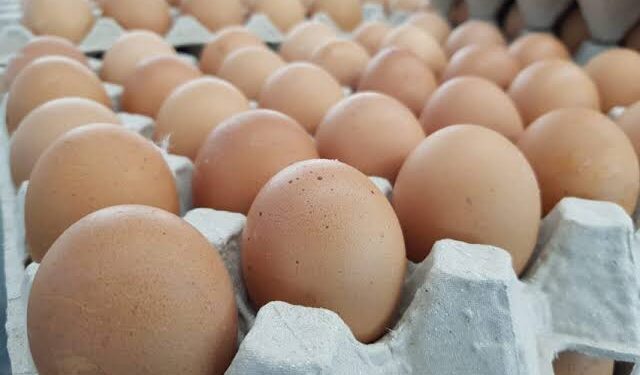The Poultry Association of Nigeria (PAN), Lagos State, and other stakeholders in the sector have lamented the incessant hike in the price of egg just as they called for the Federal Government’s intervention.
They also lamented that egg which used to be the cheapest source of protein was getting out of the reach of many Nigerians.
They said this in separate interviews with the News Agency of Nigeria (NAN) on Sunday in Lagos.
The Chairman, Poultry Association of Nigeria (PAN), Mr Mojeed Iyiola, blamed the price hike on the high cost of raw materials for bird feed.
“The price of a crate of egg keeps getting expensive because of the high cost of raw materials. Despite all the government’s support and the open window for the importation of maize, the prices of feeds are not even going down at all.
“This is because other raw materials for the formulation of bird feeds are not being subsidised at all.
“Although maize takes between 60 and 65 per cent of feed production, other materials are on the high side.
“We still pay high prices for materials like soya, methylene, lysine and premix. So, the intervention of government has not even reflected at all on the price of poultry produce,” Iyiola said.
The PAN chairman said the least price of a crate of eggs from the farm gate was N5,000.
“We sold eggs in commemoration of the World Food Day on the 16th of October at the least price of N5,000 per crate.
“The incessant price hike has made the business tiring for most poultry farmers.
“The least price for a crate of eggs goes for between N4,300 and N4,500, and this is the smallest size. While regular crates of eggs sell at N5,000 and above.
“However, the price of maize has come down to between N750,000 and N800,000 per tonne as against N900,000 and N1,000,000 it was sold for a month ago,” he said.
Other stakeholders and traders of the produce blamed the lack of proper egg production infrastructure, human factors, economic constraints, and environmental factors as reasons for the dire situation for egg sellers and consumers.
Mrs Taiwo Bashiru, an egg seller at the Boundary Market, told NAN that she had been in the egg business for a long time.
Bashiru said the price of eggs had skyrocketed like never before.
“I have sold eggs for over 10 years, but never have I seen prices skyrocket like this.
“Demand is high, especially among low-income households. The major challenge we face is inconsistency in supply due to feed costs and transportation expenses,” Bashiru said.
Ms Bummi Olayinka, another egg seller, lamented that inflation had impacted the poultry industry.
Olayinka lamented that a crate of eggs which was sold at N4,600 three months ago had risen to N5,600 depending on the location.
“The increase is attributed to the surge in poultry feed prices, transportation costs due to rising fuel prices, and high maintenance costs for birds.
“These factors have compounded production costs, pushing egg prices higher,” Olayinka said.
A consumer, Mrs Ajoke Folorunsho, said the nutritional value of eggs to human diet was enormous and as such, it should be the most affordable protein everyone should afford.
“Egg should be affordable as it is rich in protein. My family loves them boiled. However, the price hike has taken a toll.
“I buy eggs regularly, but the prices have gone up significantly and many families can no longer afford it,” she said.
Another consumer, Mrs Ifeoma Okoli, lamented that many Nigerians were finding it difficult to include protein in their food.
Okoli noted that the prices of meat, fish, beans and eggs had skyrocketed in the recent time.
“They are talking of eating one egg daily, how many families can afford it with the challenges in the country.
“A crate of eggs is between N5,900 and N6,000, while an egg is sold for N250 to N300 depending on the location,” she said.
On her part, Mrs Adegbite Samiat, an egg depot owner at Amuwo Odofin, called for the government’s intervention on the sector.
“Government support for poultry farmers will help stabilise prices.
“Disease outbreaks affect egg production significantly as well. If the government provides vaccines and medication, it will reduce the risks,” Adegbite said. (NAN)











